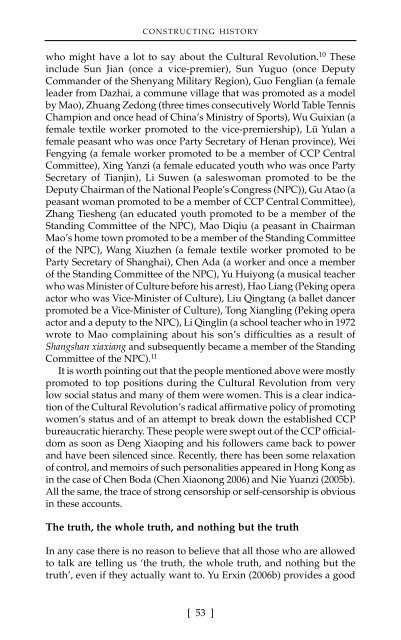Battle for China's Past : Mao and the Cultural Revolution
Battle for China's Past : Mao and the Cultural Revolution
Battle for China's Past : Mao and the Cultural Revolution
You also want an ePaper? Increase the reach of your titles
YUMPU automatically turns print PDFs into web optimized ePapers that Google loves.
CONSTRUCTING HISTORY<br />
who might have a lot to say about <strong>the</strong> <strong>Cultural</strong> <strong>Revolution</strong>. 10 These<br />
include Sun Jian (once a vice-premier), Sun Yuguo (once Deputy<br />
Comm<strong>and</strong>er of <strong>the</strong> Shenyang Military Region), Guo Fenglian (a female<br />
leader from Dazhai, a commune village that was promoted as a model<br />
by <strong>Mao</strong>), Zhuang Zedong (three times consecutively World Table Tennis<br />
Champion <strong>and</strong> once head of China’s Ministry of Sports), Wu Guixian (a<br />
female textile worker promoted to <strong>the</strong> vice-premiership), Lü Yulan a<br />
female peasant who was once Party Secretary of Henan province), Wei<br />
Fengying (a female worker promoted to be a member of CCP Central<br />
Committee), Xing Yanzi (a female educated youth who was once Party<br />
Secretary of Tianjin), Li Suwen (a saleswoman promoted to be <strong>the</strong><br />
Deputy Chairman of <strong>the</strong> National People’s Congress (NPC)), Gu Atao (a<br />
peasant woman promoted to be a member of CCP Central Committee),<br />
Zhang Tiesheng (an educated youth promoted to be a member of <strong>the</strong><br />
St<strong>and</strong>ing Committee of <strong>the</strong> NPC), <strong>Mao</strong> Diqiu (a peasant in Chairman<br />
<strong>Mao</strong>’s home town promoted to be a member of <strong>the</strong> St<strong>and</strong>ing Committee<br />
of <strong>the</strong> NPC), Wang Xiuzhen (a female textile worker promoted to be<br />
Party Secretary of Shanghai), Chen Ada (a worker <strong>and</strong> once a member<br />
of <strong>the</strong> St<strong>and</strong>ing Committee of <strong>the</strong> NPC), Yu Huiyong (a musical teacher<br />
who was Minister of Culture be<strong>for</strong>e his arrest), Hao Liang (Peking opera<br />
actor who was Vice-Minister of Culture), Liu Qingtang (a ballet dancer<br />
promoted be a Vice-Minister of Culture), Tong Xiangling (Peking opera<br />
actor <strong>and</strong> a deputy to <strong>the</strong> NPC), Li Qinglin (a school teacher who in 1972<br />
wrote to <strong>Mao</strong> complaining about his son’s difficulties as a result of<br />
Shangshan xiaxiang <strong>and</strong> subsequently became a member of <strong>the</strong> St<strong>and</strong>ing<br />
Committee of <strong>the</strong> NPC). 11<br />
It is worth pointing out that <strong>the</strong> people mentioned above were mostly<br />
promoted to top positions during <strong>the</strong> <strong>Cultural</strong> <strong>Revolution</strong> from very<br />
low social status <strong>and</strong> many of <strong>the</strong>m were women. This is a clear indication<br />
of <strong>the</strong> <strong>Cultural</strong> <strong>Revolution</strong>’s radical affirmative policy of promoting<br />
women’s status <strong>and</strong> of an attempt to break down <strong>the</strong> established CCP<br />
bureaucratic hierarchy. These people were swept out of <strong>the</strong> CCP officialdom<br />
as soon as Deng Xiaoping <strong>and</strong> his followers came back to power<br />
<strong>and</strong> have been silenced since. Recently, <strong>the</strong>re has been some relaxation<br />
of control, <strong>and</strong> memoirs of such personalities appeared in Hong Kong as<br />
in <strong>the</strong> case of Chen Boda (Chen Xiaonong 2006) <strong>and</strong> Nie Yuanzi (2005b).<br />
All <strong>the</strong> same, <strong>the</strong> trace of strong censorship or self-censorship is obvious<br />
in <strong>the</strong>se accounts.<br />
The truth, <strong>the</strong> whole truth, <strong>and</strong> nothing but <strong>the</strong> truth<br />
In any case <strong>the</strong>re is no reason to believe that all those who are allowed<br />
to talk are telling us ‘<strong>the</strong> truth, <strong>the</strong> whole truth, <strong>and</strong> nothing but <strong>the</strong><br />
truth’, even if <strong>the</strong>y actually want to. Yu Erxin (2006b) provides a good<br />
[ 53 ]
















